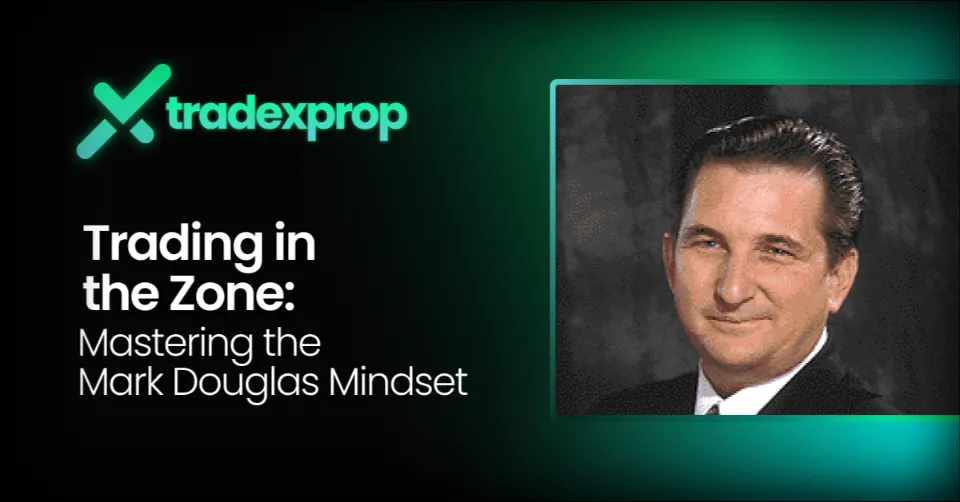Many traders struggle with consistency, emotional control, and discipline, which often leads to erratic performance and frustration. Trading in the Zone by Mark Douglas addresses these challenges, teaching traders how to develop the right mindset to navigate the markets with confidence and control.
Understanding the trading zone isn’t just about technical skills—it’s about reprogramming your mental approach to risk, uncertainty, and decision-making. In this article, we’ll explore the core principles of Mark Douglas’ trading psychology and how you can apply them to your trading journey.
What is Trading in the Zone?
Mark Douglas defines the trading zone as a state of mental clarity, confidence, and discipline, where traders make objective decisions without emotional interference. When a trader is in the zone, they:




This mental state eliminates self-doubt and impulsive decisions, allowing traders to trust their strategy and focus on probabilities rather than trying to control market outcomes.
The 5 Fundamental Truths of Trading (Mark Douglas)
Mark Douglas outlines five fundamental truths that every trader must accept to succeed. These truths are essential for achieving the trading zone:

The market is unpredictable, and no trade is ever guaranteed to win. Instead of trying to predict the outcome, focus on risk management and execution.

Success in trading doesn’t come from predicting every move—it comes from executing a strategy that works over a series of trades. The key is thinking in probabilities.

Even with a high-probability setup, there will be losses. However, over 100+ trades, a trader who sticks to their system will see profitable results if their edge is strong.

Your trading strategy is a probability-based system, not a certainty. Stay disciplined and execute trades based on your edge—not emotions.

No two trading situations are exactly alike, even if they look similar. React to the market in real-time and avoid making decisions based on past trades.
How to Develop a Winning Trader Mindset
Achieving the trading zone requires a shift in mindset and behavior. Mark Douglas emphasizes the need to detach from outcomes and focus on process-driven trading. Here’s how to implement his principles:
1. Think in Probabilities, Not Certainties
Markets are unpredictable, and no trade setup is 100% guaranteed. Instead of focusing on whether a single trade wins or loses, look at your long-term performance.



2. Develop an Emotionally Neutral Approach
Most traders struggle because they let fear and greed dictate their decisions. Trading in the zone means acting without emotional bias.



3. Trust Your Edge and Stop Overanalyzing
Many traders second-guess themselves, leading to hesitation and missed opportunities. The solution? Trust your system.



4. Cut Losses Without Emotional Attachment
Successful traders treat losses as business expenses. They don’t hold onto bad trades hoping for a reversal.



5. Build Consistency Through a Trading Plan
Mark Douglas emphasizes the importance of structured decision-making. A clear trading plan reduces emotional interference.



The Difference Between a Struggling Trader and a Consistent Trader
Mark Douglas highlights key differences between amateur traders and professionals who trade in the zone.
| Struggling Trader | Trader in the Zone |
|---|---|
| Hesitates to enter trades | Executes trades without hesitation |
| Feels anxious about losses | Accepts losses as part of trading |
| Tries to predict market movements | Focuses on probabilities |
| Moves stop-losses emotionally | Sticks to pre-defined rules |
| Overtrades or revenge trades | Trades selectively based on strategy |
Common Myths About Trading in the Zone
🚫 Myth: Trading in the zone means no losses.
✅ Truth: Losses are unavoidable; what matters is sticking to the process.
🚫 Myth: Trading in the zone requires constant market analysis.
✅ Truth: Overanalyzing leads to indecision. A structured approach works better.
🚫 Myth: Only experienced traders can achieve the trading zone.
✅ Truth: Even beginners can develop discipline and consistency with the right mindset.
Final Thoughts on Mastering the Trading Zone
Achieving trading in the zone is about mastering your mind, emotions, and risk management. Mark Douglas’ principles emphasize detachment from trade outcomes, disciplined execution, and probability-based thinking.
To become a consistent, profitable trader, you must:
✔ Accept market uncertainty and think in probabilities.
✔ Develop a structured trading plan and stick to it.
✔ Remove emotional reactions and trade with confidence.
If you struggle with trading psychology, start by reading Mark Douglas’ Trading in the Zone and applying these principles step by step.






